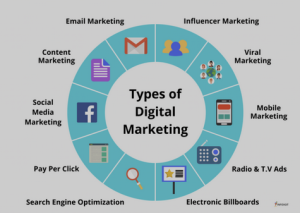Digital marketing has significantly impacted consumer behavior by transforming the way businesses connect with their target audience, build brand awareness, and influence purchasing decisions. The purpose of this study is to highlight the impact of digital marketing on consumer behavior.

Impact Of Digital Marketing On Consumer Behavior
-
Table of Contents
ToggleInformation Accessibility:
- Impact: Digital marketing provides consumers with easy access to information about products, services, and brands.
- Behavioral Change: Consumers are now more informed, conducting online research before making purchase decisions. They rely on websites, reviews, and social media to gather information.
-
Personalization:
- Impact: Digital marketing allows for personalized and targeted messaging based on user preferences, behavior, and demographics.
- Behavioral Change: Consumers now expect personalized experiences, and businesses can create tailored content and offers that resonate with individual preferences.
-
Social Media Influence:
- Impact: Social media platforms play a significant role in digital marketing, influencing consumer opinions and trends.
- Behavioral Change: Consumers are influenced by social media content, reviews, and recommendations, impacting their purchasing decisions. Social media also provides a platform for customer engagement and brand advocacy.
-
E-commerce and Online Shopping:
- Impact: Digital marketing has facilitated the growth of e-commerce, providing consumers with the ability to shop online.
- Behavioral Change: Consumers increasingly prefer online shopping for its convenience, variety, and the ability to compare prices and reviews easily.
-
Instant Gratification:
- Impact: Digital marketing enables instant communication and transactions.
- Behavioral Change: Consumers expect quick responses, instant access to information, and seamless online experiences. Features like one-click purchasing and fast shipping have become influential factors in purchasing decisions.
-
User-Generated Content:
- Impact: Digital marketing encourages user-generated content through reviews, testimonials, and social media interactions.
- Behavioral Change: Consumers trust peer recommendations and authentic user-generated content, influencing their perceptions and decisions.
-
Mobile Accessibility:
- Impact: The rise of mobile devices and mobile-friendly digital marketing strategies.
- Behavioral Change: Consumers are increasingly using smartphones for browsing, shopping, and engaging with content. Mobile accessibility has led to on-the-go research and impulse purchasing behavior.
-
Data-driven Insights:
- Impact: Digital marketing tools provide valuable data and insights into consumer behavior.
- Behavioral Change: Businesses can analyze data to understand consumer preferences, track customer journeys, and optimize marketing strategies based on real-time insights.
-
Email Marketing:
- Impact: Email remains a powerful tool in digital marketing for direct communication with consumers.
- Behavioral Change: Email marketing campaigns can influence consumer behavior through personalized offers, promotions, and targeted content.
-
Influencer Marketing:
- Impact: Digital marketing leverages influencers to promote products and services.
- Behavioral Change: Consumers are influenced by influencers they trust, leading to increased brand awareness and product adoption.
-
Augmented Reality (AR) and Virtual Reality (VR):
- Impact: AR and VR technologies in digital marketing provide immersive experiences.
- Behavioral Change: Consumers engage more deeply with brands using AR and VR, enhancing their understanding of products and services before making purchase decisions.
-
Retargeting and Remarketing:
- Impact: Digital marketing allows businesses to retarget consumers who have previously interacted with their brand.
- Behavioral Change: Consumers may be more likely to convert after being reminded of products or services they’ve shown interest in, creating a more personalized and persistent marketing approach.
In conclusion, digital marketing has revolutionized the way businesses connect with consumers, shaping their behavior by providing information, personalization, and engaging experiences. As technology continues to advance, businesses will need to adapt their digital marketing strategies to meet evolving consumer expectations and preferences.
